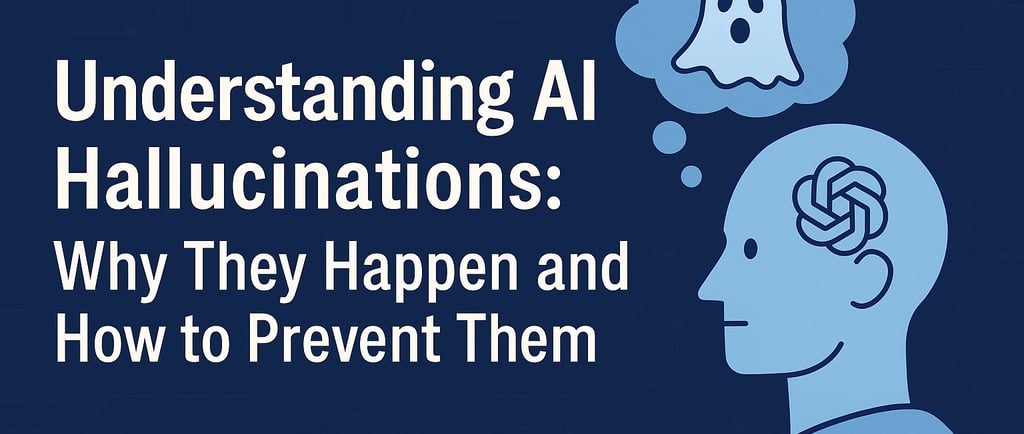Why AI Sometimes Hallucinates (Why They Happen and How to Prevent Them)
Discover why AI hallucinations happen, how to spot them, and the top 5 ways to prevent them in your business. Get smarter about using AI tools today.
Shannon McDowell
8/4/20253 min read


Why AI Sometimes Hallucinates (Why They Happen and How to Prevent Them)
I was working with a client last week when ChatGPT confidently told us that the first iPhone was released in 2005. Not even close – it was 2007. This kind of thing happens more than you'd think, and it's called an AI hallucination.
If you've ever caught an AI system feeding you completely wrong information while sounding absolutely certain about it, you know how frustrating this can be. The worst part? These tools are so convincing that it's easy to just accept what they say without questioning it.
What's Really Going On Here?
Here's the thing about AI that most people don't understand: these systems aren't actually "thinking" or "knowing" anything. They're incredibly sophisticated pattern-matching machines that predict what word should come next based on everything they've seen before.
Imagine if someone asked you to continue a story, but you could only see random sentences from thousands of other stories. You'd probably do a decent job most of the time, but occasionally you'd fill in gaps with educated guesses that turn out to be completely wrong.
That's essentially what happens when AI hallucinates. The system encounters a gap in its knowledge and decides to wing it rather than admit uncertainty.
The Real Culprits Behind AI Nonsense
After working with these tools for a while, I've noticed hallucinations usually happen because of a few specific issues:
Missing information – If the AI wasn't trained on enough data about your topic, it'll improvise. And not always well.
Unclear questions – Ask something vague like "tell me about that company," and you're basically inviting the AI to guess what you mean.
Outdated knowledge – Most AI models have a knowledge cutoff date. Ask about something that happened after that, and you're rolling the dice.
Creative settings – Many AI tools have a "creativity" dial. Turn it up too high, and you get more imaginative (but less accurate) responses.
When AI Gets It Spectacularly Wrong
I've seen some doozies over the years. Lawyers have submitted court briefs citing completely fictional legal cases that ChatGPT invented. Researchers have referenced academic papers that don't exist. I even saw one instance where an AI generated a detailed biography of a person who turned out to be entirely fictional.
The medical advice thing really gets me. I've seen AI confidently recommend medications that don't exist or suggest treatments that could actually be harmful. Never, ever use AI as your only source for health information.
How I've Learned to Work With AI (Without Getting Burned)
After dealing with enough AI mishaps, I've developed some habits that really cut down on the nonsense:
Get specific with your requests. Instead of "What should I know about marketing?" try "What are three proven email marketing strategies for small service businesses?"
Always ask for sources. I'll often add something like "Please include where this information comes from" to my prompts. It doesn't guarantee accuracy, but it gives me something to fact-check.
Upload your own documents when possible. Tools like ChatGPT can now work with files you provide. This grounds the AI in real information rather than letting it guess.
Adjust the creativity settings. For factual tasks, I keep the "temperature" or creativity settings low. Save the wild creativity for brainstorming sessions.
Trust but verify. I treat AI like a smart intern – capable of great work, but everything needs a second look before it goes out the door.
The Bottom Line
Look, AI hallucinations aren't going away tomorrow. But they're not a reason to avoid these tools entirely either. Once you understand why they happen and develop good habits around them, AI becomes incredibly useful.
I use AI for research, writing first drafts, analyzing data, and brainstorming ideas. But I never use it as my final authority on anything important. It's a powerful assistant, not a replacement for human judgment.
The key is knowing what you're working with. These aren't all-knowing oracles – they're very sophisticated autocomplete systems. Treat them accordingly, and you'll get much better results.
Transformative AI Solutions
© 2025. Transformative AI Solutions.
All rights reserved.
Contact: admin@transformativeaisolutions.com
Legal